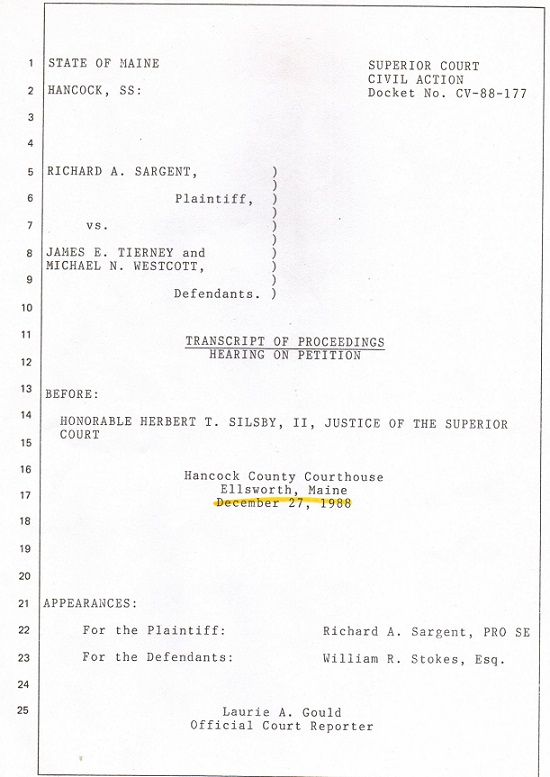
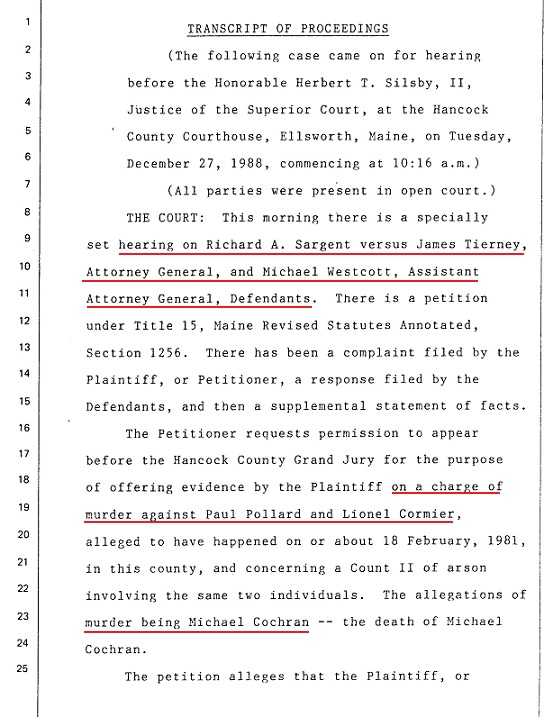
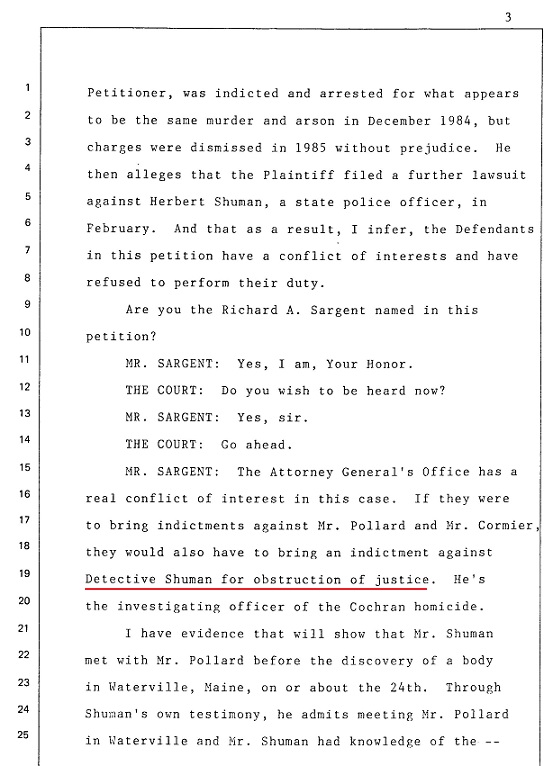
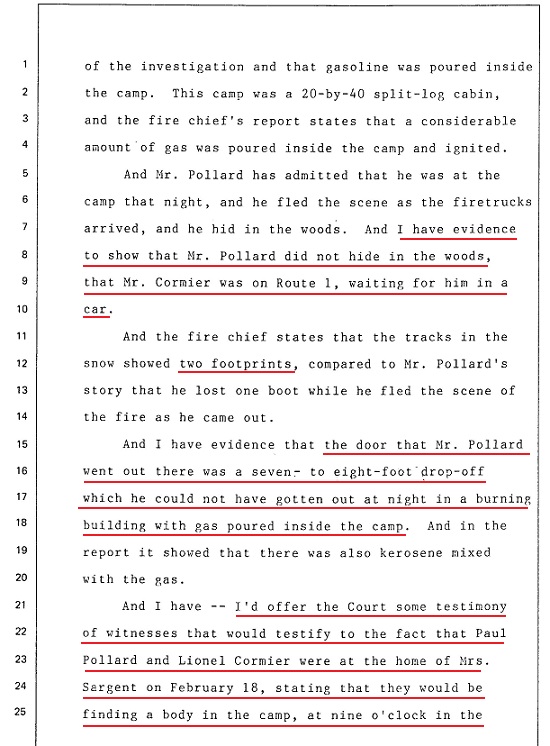
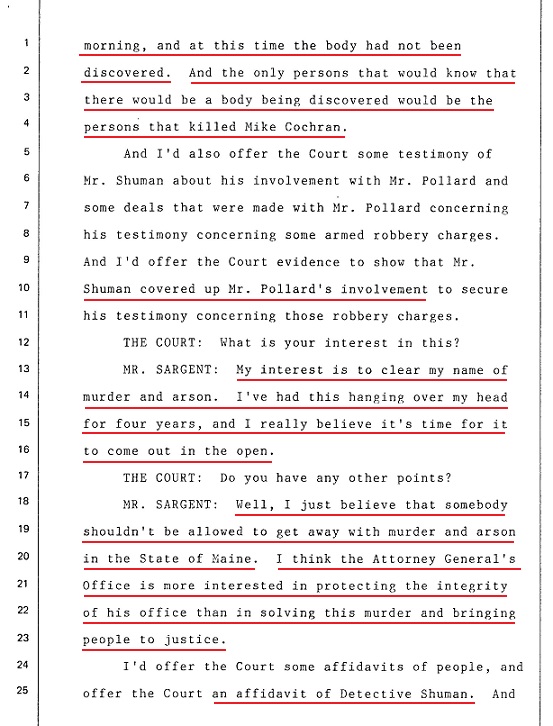
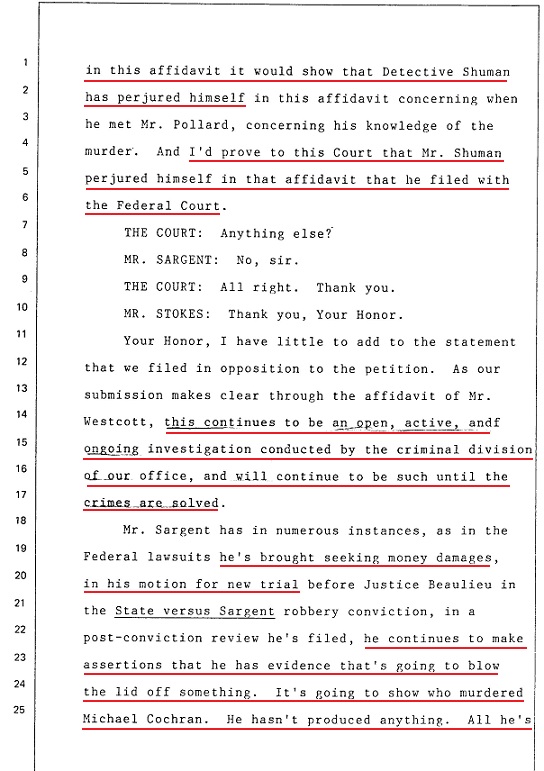
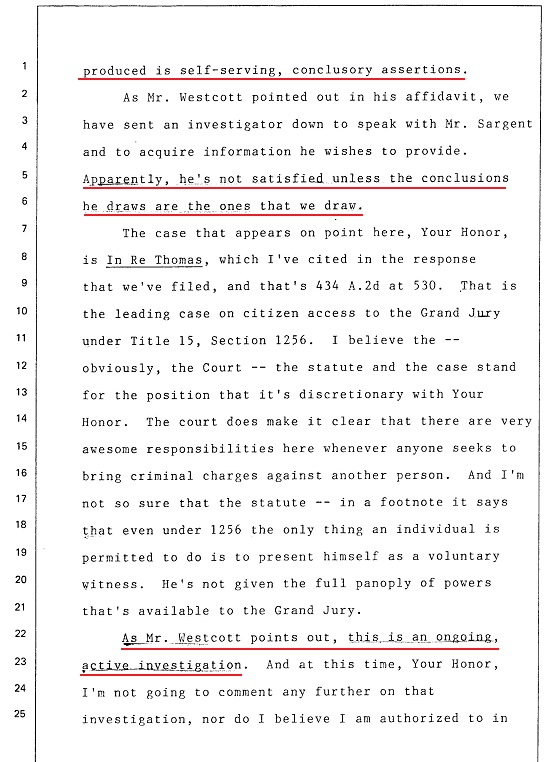
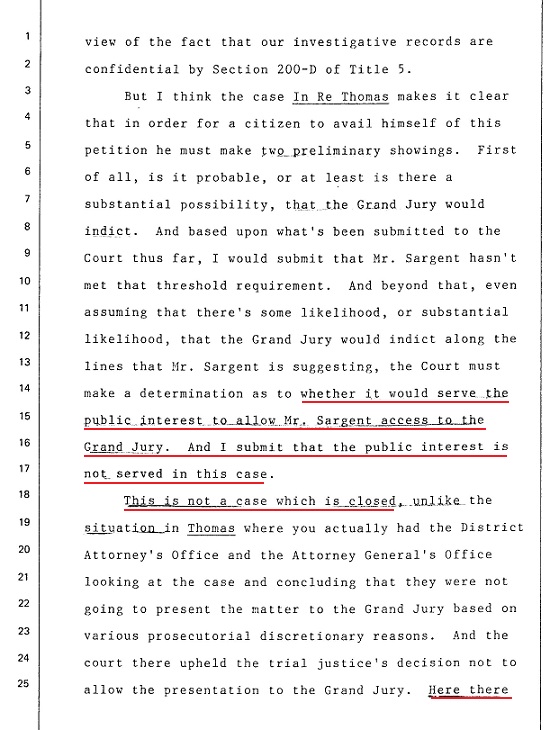
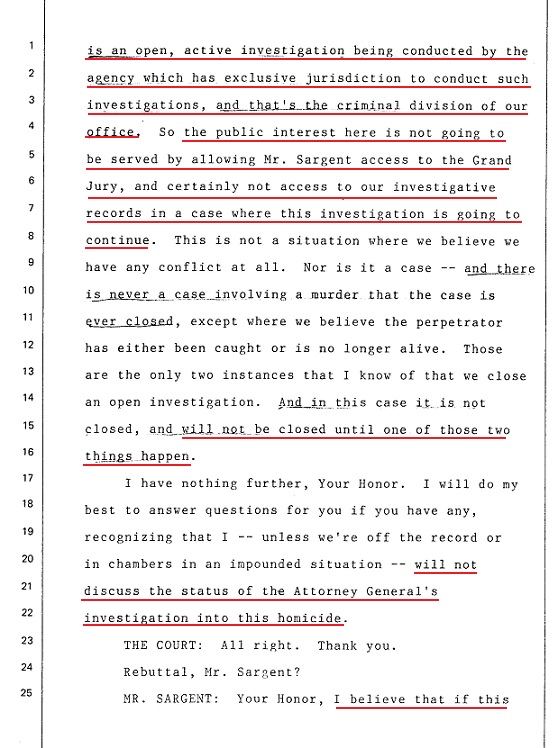
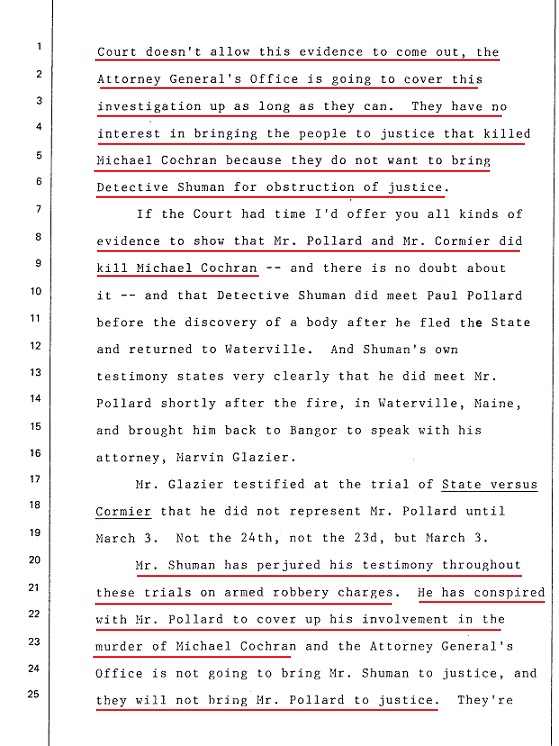
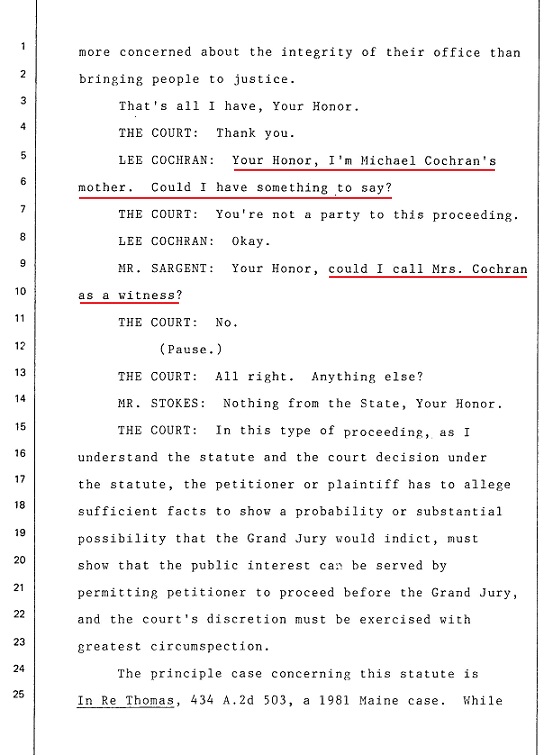
"The Petitioner requests permission to appear before the Hancock County Grand Jury for the purpose of offering evidence by the Plaintiff on a charge of murder against Paul Pollard and Lionel Cormier, alleged to have happened on or about 18 February, 1981, in this county, and concerning a Count II of arson involving the same two individuals. The allegations of murder being Micheal Cochran—the death of Micheal Cochran.
“The petition alleges that the Plaintiff, or Petitioner, was indicted and arrested for what appears to be the same murder and arson in December 1984, but charges were dismissed in 1985 without prejudice. He then alleges that the Plaintiff filed a further lawsuit against Herbert Shuman, a state police officer, in February. And that as a result, I infer, the Defendants in this petition have a conflict of interests and have refused to perform their duty.”
Richard had let his hair grow long while in prison and had it tied back. I watched him stand with his documents while trying to present his case to the judge. He was up against the State of Maine, a powerful régime, I had discovered.
Richard began by saying, “The Attorney General’s Office has a real conflict of interest in this case. If they were to bring indictments against Mr. Pollard and Mr. Cormier, they would also have to bring an indictment against Detective Shuman for obstruction of justice. He’s the investigating officer on the Cochran homicide. ...
"Mr. Pollard has admitted that he was at the camp that night, and he fled the scene as the fire trucks arrived, and he hid in the woods,” Richard explained. “And I have evidence to show that Mr. Pollard did not hide in the woods that Mr. Cormier was on Route 1, waiting for him in a car. And the fire chief states that the tracks in the snow showed two footprints, compared to Mr. Pollard's story that he lost one boot while he fled the scene of the fire as he came out.”
Richard told the court he had further evidence that the door Pollard said he escaped from had seven-to-eight-foot drop-off and that it would have been impossible for him to leave a burning cabin doused with gasoline in that way. There was also kerosene mixed with gas, according to the investigation report."
Richard also said "Paul Pollard and Lionel Cormier were at Frances Sargent’s home the morning of Feb. 18, stating that they would be finding a body in the camp, at nine o’clock in the morning, and at this time the body had not been discovered. And the only persons that would know that there would be a body being discovered would be the persons that killed Mike Cochran.”
The judge asked, “What is your interest in this?”
“My interest is to clear my name of murder and arson. I’ve had this hanging over my head for four years, and I really believe it’s time for it to come out in the open.”
“Do you have any other points?”
“Well, I just believe that somebody shouldn’t be allowed to get away with murder and arson in the State of Maine. I think the Attorney General’s office is more interested in protecting the integrity of his office than in solving this murder and bringing people to justice.”
“All right. Thank you.”
Deputy Attorney General William (Bill) Stokes said, “Your Honor, I have little to add to the statement that we filed in opposition to the petition. As our submission makes clear through the affidavit of Mr. Westcott, this continues to be an open, active, and ongoing investigation conducted by the criminal division of our office, and will continue to be such until the crimes are solved. Mr. Sargent has in numerous instances, as in the Federal lawsuits he’s brought seeking money damages in his motion for a new trial before Justice Beaulieu in the State versus Sargent robbery conviction, in a post-conviction review he’s filed, he continues to make assertions that he has evidence that’s going to blow the lid off something. It’s going to show who murdered Micheal Cochran. He hasn’t produced anything. All he’s produced is self-serving, conclusory assertions. As Mr. Westcott pointed out in his affidavit, we have sent an investigator down to speak with Mr. Sargent and to acquire information he wishes to provide. Apparently, he’s not satisfied unless the conclusions he draws are ones that we draw.”
Deputy AG Stokes again pointed out that the case was an “ongoing, active investigation” and that allowing Richard to present his evidence to a grand jury didn’t “serve the public interest.
“I’m not going to comment any further on that investigation, nor do I believe I am authorized to, in view of the fact that our investigative records are confidential by Section 200-D of Title 5. [T]he court must make a determination as to whether it would serve the public interest to allow Mr. Sargent access to the Grand Jury. And I submit that the public interest is not served in this case. This is not a case which is closed. … Here there is an open, active investigation being conducted by the agency which has exclusive jurisdiction to conduct such investigation, and that’s the criminal division of our office.
So the interest here is not going to be served by allowing Mr. Sargent access to the Grand Jury and certainly not access to our investigative records in a case where this investigation is going to continue.…—and there is never a case involving a murder that the case is ever closed, except where we believe the perpetrator has either been caught or is no longer alive. Those are the only two instances that I know of that we close an open investigation. And in this case, it is not closed, and will not be closed until one of those two things happen. I have nothing further, Your Honor “
“All right. Thank you. Rebuttal, Mr. Sargent?”
“Your Honor, I believe that if this Court doesn’t allow this evidence to come out, the Attorney General’s Office is going to cover this investigation up as long as they can. They have no interest in bringing the people to justice that killed Micheal Cochran because they do not want to bring Detective Shuman for obstruction of justice. If the Court had time, I’d offer you all kinds of evidence to show that Mr. Pollard and Mr. Cormier did kill Micheal Cochran—and there is no doubt about it. ...”
I knew Richard had a tough sell going up against the Maine Attorney General’s Office. I thought I might be able to help convince the judge to allow Richard to take his case to a grand jury and spoke up.
“Your Honor, I’m Micheal Cochran’s mother. Could I have something to say?”
He very sternly said, “You’re not a party to this proceeding.”
I mumbled a quick, “Okay,” and sat down.
Richard said, “Your Honor, could I call Mrs. Cochran as a witness?”
The judge gave Richard a flat, “No,” and said, “All right, anything else?”
Mr. Stokes, “Nothing from the state, your Honor.”
With no further testimony, the judge handed down his decision. He denied Richard’s petition on the basis that he couldn’t find a conflict of interest in the attorney general’s office that would prompt a cover-up. Upon reviewing the evidence. He said “There are a considerable amount of allegations and recitation of supporting facts on this petition. But having read through those allegations, they appear to be from allegation of facts or statements of facts, appear to be from other court cases, affidavits, and so on. They appear to be quite a combination of admissible evidence and non-admissible evidence. But having looked at all that, I can’t make what I think is a quantum leap from those statements of fact to the conclusion that the Attorney General’s Office has a conflict of interest or has conducted any sort of cover-up [or] other type of improper activity.”
Judge Silsby then aid “Probably one of the most common reasons why the State often times loses cases is because the case was simply premature. [It is now nearly 41 years]
“Now, the record also shows that this case is open and active, and I don’t believe that public interest would be served whatsoever by interfering in the due process of administration of the criminal justice system in this State by ordering a proceeding to supersede or substitute for the Attorney General’s Office.
“In exercising my discretion called for under the statute and for the foregoing reasons, I come to the conclusion that the petition must be DENIED.”